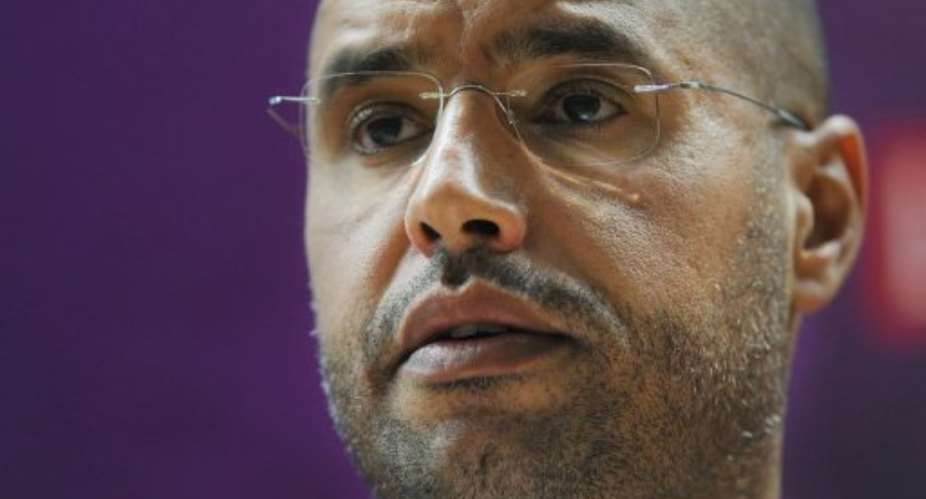THE HAGUE (AFP) - The International Criminal Court denied on Monday that it had agreed that Seif al-Islam, slain Libyan dictator Moamer Kadhafi's most prominent son, can be tried in Libya.
"The ICC has made no decision on this matter," court spokesman Fadi el-Abdallah told AFP in response to a claim by Libya's Justice Minister Ali H'mida Ashur that Seif would be judged by a Libyan court.
The ICC said earlier in a Twitter message that it had received a reply from the Libyan authorities to questions asked by its judges by a Monday deadline.
"The ICC has accepted that Seif al-Islam will be tried in Libya by the Libyan judiciary," Ashur told AFP.
"The trial will take place in Libya. The Libyan justice is competent and we gave the file (on Seif) to the ICC on Friday," Ashur added.
Seif, 39, who was arrested on November 19, is in the custody of the military council of Zintan, a town 180 kilometres (110 miles), southwest of Tripoli.
He is wanted by the ICC on charges of crimes against humanity allegedly committed during the conflict in Libya.
Libya's National Transitional Council had already told the ICC in a letter published on November 24 that Tripoli wanted to try him.
The international court had asked Tripoli in December to say by January 6 "if and when" Seif would be handed over for trial in The Hague. That deadline was extended to January 23 at Libya's request because of the "security situation" in the country since the fall of Kadhafi in October.
The judges also wanted to know if Seif had been arrested on the ICC warrant issued in June and if it was correct that he was being held incommunicado.
Human Rights Watch said on December 21 after visiting Seif in Zintan that he appeared to be held in good conditions but called on the Libyan authorities to grant him access to a lawyer.
The New-York based Human Rights Watch, in its World Report 2012, has raised concerns over Libya's judicial system.
"Libya's interim government and its international supporters should make it an urgent priority to build a functioning justice system and begin legal reform that protects human rights after Moamer Kadhafi," the group said in the report.
Sarah Leah Whitson, Middle East and North Africa director at Human Rights Watch said in the report that "independent courts and the rule of law will help ensure stability in a country emerging from four decades of dictatorship and eight months of war."





 There’s nothing you can do for us; just give us electricity to save our collapsi...
There’s nothing you can do for us; just give us electricity to save our collapsi...
 Ghanaian media failing in watchdog duties — Sulemana Braimah
Ghanaian media failing in watchdog duties — Sulemana Braimah
 On any scale, Mahama can't match Bawumia — NPP Youth Organiser
On any scale, Mahama can't match Bawumia — NPP Youth Organiser
 Never tag me as an NPP pastor; I'm 'pained' the 'Akyem Mafia' are still in charg...
Never tag me as an NPP pastor; I'm 'pained' the 'Akyem Mafia' are still in charg...
 Your refusal to dedicate a project to Atta Mills means you never loved him — Kok...
Your refusal to dedicate a project to Atta Mills means you never loved him — Kok...
 2024 elections: I'm competent, not just a dreamer; vote for me — Alan
2024 elections: I'm competent, not just a dreamer; vote for me — Alan
 2024 elections: Forget NPP, NDC; I've the Holy Spirit backing me and nothing wil...
2024 elections: Forget NPP, NDC; I've the Holy Spirit backing me and nothing wil...
 2024 elections: We've no trust in judiciary; we'll ensure ballots are well secur...
2024 elections: We've no trust in judiciary; we'll ensure ballots are well secur...
 Performance tracker: Fire MCEs, DCEs who document Mahama's projects; they're not...
Performance tracker: Fire MCEs, DCEs who document Mahama's projects; they're not...
 Train crash: Railway ministry shares footage of incident
Train crash: Railway ministry shares footage of incident
